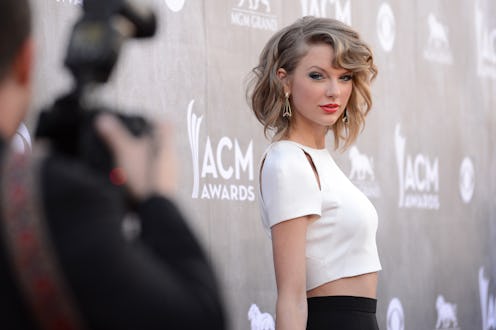Entertainment
Taylor Should Change the Way You Listen to Music
By now, you probably know that Taylor Swift wrote an op-ed for The Wall Street Journal on Monday about the state of the music industry. But did you know that in the midst of chatting about digital piracy, dwindling album sales, and the power of fans, Swift found a way to slip in a subtle swipe at her own detractors (namely, those who criticize her for allegedly transforming from a country star into a pop star overnight)? It's true! She's a sly one, that T. Swift, and she makes some really excellent points about her career — and music in general — that we absolutely need to be talking about. Seriously: this could change the way that you listen to music going forward.
After briefly discussing the importance of having a large social media following in the music industry today, Swift shifts her focus to an issue that she dubs, "genre distinction." She writes:
Another theme I see fading into the gray is genre distinction. These days, nothing great you hear on the radio seems to come from just one musical influence. The wild, unpredictable fun in making music today is that anything goes. Pop sounds like hip hop; country sounds like rock; rock sounds like soul; and folk sounds like country—and to me, that's incredible progress. I want to make music that reflects all of my influences, and I think that in the coming decades the idea of genres will become less of a career-defining path and more of an organizational tool.
Hm, I wonder why she felt it was so important to bring this up? Well, since the release of Swift's second, Grammy Award-winning album, Fearless, she's been criticized for putting out music that's far "too pop" for a supposedly country artist. Of course, the criticism only intensified after the release of her last album, Red, which featured several songs Swift had recorded with one of pop music's most prolific producers, Max Martin ("We Are Never Ever Getting Back Together," "I Knew You Were Trouble," and "22"). Knowing that, it makes sense that our cultural preoccupation with genre distinction is something that's near and dear to Swift's heart.
She's right, of course — Top 40 radio is probably the most diverse it's been in a long time. Just take a look at some of the most popular songs on the airwaves right now: Nico & Vinz's "Am I Wrong," Iggy Azalea's — "Fancy," Calvin Harris' "Summer," Magic!'s "Rude," Sam Smith's "Stay With Me," and Paramore's "Ain't It Fun." Hip-hop, rap, dance, pop, adult contemporary, rock — all of those different styles of music are represented on today's popular radio stations. So, why should Swift feel confined to making one specific genre? Especially when her experience creating country music has so greatly enriched her more pop-leaning material — and vice versa.
Would "We Are Never Ever Getting Back Together" have been a big hit without Swift's trademark storytelling style of songwriting, something she likely picked up from the world of country? Would "Mean," arguably one of Swift's most traditional country songs to date, have been able to win two Grammys without it's expertly crafted hook, something she likely picked up from the world of pop? Food for thought.
Additionally, genre distinction is largely a subjective endeavor. A song one person considers to be pure pop, another might think is more rock-influenced, and so on. In fact, I bet some people probably won't agree with the way that I classified the six songs listed above — and that's okay! Genres are constantly evolving and borrowing from one another — they mix and overlap. Are the labels even necessary? Sure, they might make it easier to organize your iTunes library, but otherwise, I'm not so sure they're that important.
I suspect that some of the backlash against Swift comes from her own fans who just legitimately don't like her more recent, "poppier" material. I understand. It's hard when an artist you love starts making music that you just don't connect with. But should a young artist like Swift stop growing, stop challenging herself as a musician, just so that she can try to please a certain subset of her fan base? After all, it's impossible to make everyone happy.
In college, I wouldn't even give Swift's Fearless album a chance. Sure, I sang along with "Love Story" and "You Belong With Me" when I heard them on the radio, but Swift made country music — I didn't think I liked country music. But when I was finally able to get past the label, I discovered that Swift's music was so much more than just the tired, inaccurate country music stereotypes I had swimming around in my head. Now, she's one of my favorite artists. Admittedly, I still don't consider myself a country music fan, per se, but I've learned not to let an artist's perceived genre keep me from at least checking out their work. It's a close-minded, limiting, and frankly, stupid habit.
As Swift says, "the wild, unpredictable fun in making music today is that anything goes." It doesn't matter if Swift's a country star or a pop star — the music is what's important. I think we all need to rethink our reliance on genre distinction and labels. Just listen to what you love. That's all that really matters, anyway.
